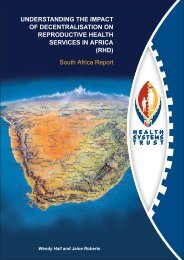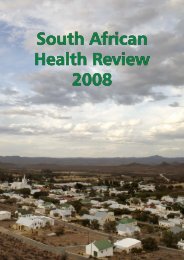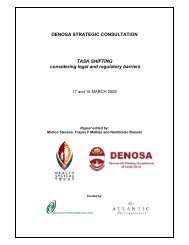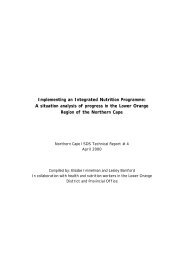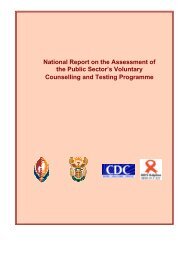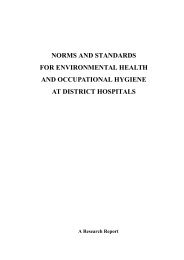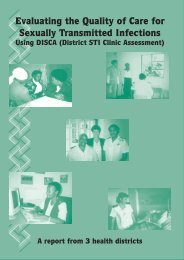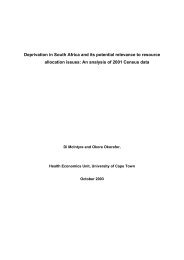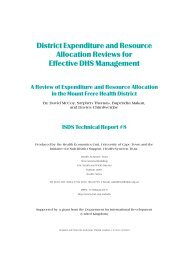SAHR 2007 - Health Systems Trust
SAHR 2007 - Health Systems Trust
SAHR 2007 - Health Systems Trust
You also want an ePaper? Increase the reach of your titles
YUMPU automatically turns print PDFs into web optimized ePapers that Google loves.
Table 1:<br />
Challenge<br />
Lack of affordability<br />
and sustainability<br />
Inequity<br />
Lack of universal<br />
coverage of essential<br />
services<br />
Inadequate<br />
competition<br />
Source:<br />
Key challenges facing the South African<br />
private health sector<br />
Key elements<br />
• Large annual increases in medical<br />
scheme contribution rates<br />
• Declining benefit packages<br />
• Increased co-payments<br />
• Membership decline<br />
• Multiple benefit options and fragmented<br />
risk pools creating greater<br />
instability within individual schemes<br />
• Rising hospital and specialist costs<br />
• Private sector resources only<br />
available to minority and not to all<br />
country’s citizens<br />
• Urban-bias in distribution of facilities<br />
and technology<br />
• Majority of health professionals are in<br />
the private sector<br />
• Government subsidy through tax<br />
exemptions on medical scheme<br />
contributions and training of health<br />
workers<br />
• Government charges below costrecovery<br />
fee levels to medical<br />
scheme members using public<br />
hospitals<br />
• Bias towards provision of hospital<br />
care, rather than preventive care<br />
• Over-servicing<br />
• Little if any attention to essential<br />
services in support of meeting the<br />
Millennium Development Goals<br />
(MDGs)<br />
Difficulty of majority of schemes in<br />
bargaining with the supply side due to:<br />
• consolidation of private hospitals<br />
• under-supply of medical specialists<br />
Adapted from multiple sources. <br />
The notion of stewardship<br />
The goal of national health systems is to improve and<br />
promote people’s health, ensure responsiveness to citizens<br />
access to and quality of health care services and to protect<br />
citizens against the financial costs of illness through fair or<br />
equitable financing mechanisms. 28 The 2000 World <strong>Health</strong><br />
Report by the WHO introduced the concept of stewardship<br />
as the most fundamental function of a health system,<br />
above service delivery, input production and financing as it<br />
<br />
This table was adapted from Table 1 in Reference 5, and complemented<br />
with information from the <strong>Health</strong> Charter and from the following documents:<br />
Wolvaardt G, Palmer N. The private sector In: South African <strong>Health</strong><br />
Review 1997. Durban: <strong>Health</strong> <strong>Systems</strong> <strong>Trust</strong>; 1997. Pearmain D. Medical<br />
Schemes and competition, unpublished presentation. Johannesburg:<br />
Board of <strong>Health</strong> Care funders; <strong>2007</strong>.<br />
makes possible the attainment of each health system goal. 28<br />
Key stewardship issues identified in the 2000 World <strong>Health</strong><br />
Report are highlighted in Box 1.<br />
Box 1:<br />
What is stewardship?<br />
Stewardship in health is the very essence of good government<br />
i.e.<br />
✧ Careful and responsible management of the well-being of<br />
the population<br />
✧ Establishing the best and fairest health system possible<br />
✧ Concern about the trust and legitimacy with which its<br />
activities are viewed by the citizenry<br />
✧ Maintaining and improving national resources for the<br />
benefit of the population<br />
Source: Adapted from WHO, 2000. 28<br />
The 2000 World <strong>Health</strong> Report highlights that health policy<br />
and strategies need to cover the private provision of services<br />
and private financing, as well as state funding and activities<br />
in order to ensure that the health system is orientated<br />
towards achieving goals that are in the public’s interest.<br />
The report further suggests that stewardship requires more<br />
than an exclusive focus on legislation and the issuing of<br />
Regulations, decrees and public orders as means of health<br />
policy. “Good stewardship needs the support of several<br />
strategies to influence the behaviour of the different stakeholders<br />
in the health system. Among these are a better<br />
information base, the ability to build coalitions of support<br />
from different groups, and the ability to set incentives, either<br />
directly or in organisational design”. 28<br />
The following comments are made in relation to the private<br />
sector:<br />
Stricter oversight and regulation of private sector providers<br />
and insurers must be placed high on national policy<br />
agendas. “Good policy needs to differentiate between<br />
providers (public or private) who are contributing to health<br />
policy goals and those who are doing damage or having<br />
no effect and encourage or sanction appropriately. Policies<br />
to change the balance between providers’ autonomy and<br />
accountability need to be monitored closely in terms of their<br />
effect on health, responsiveness and the distribution of the<br />
financing burden”. 28 Since the 2000 World <strong>Health</strong> Report,<br />
stewardship has also been explored in the health strategy<br />
of the New Partnership for Africa's Development (NEPAD) and<br />
at the international technical consultation on stewardship in<br />
September 2001. 31,32,33



